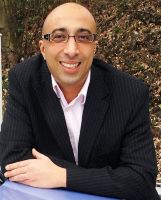 Prof. Dr. Bruno G. Pollet
Prof. Dr. Bruno G. Pollet
Canada Research Chair and Innergex Chair in Green Hydrogen Production
Director, Institute for Hydrogen Research (IHR)
Director, Green Hydrogen Lab (GH2Lab)
Université du Québec à Trois-Rivières (UQTR)
Date: October 26, 2022
Time: 1300–1400h ET
Sponsors: Gamry Instruments, Biologic, Hiden Analytical
Green hydrogen (GH2) is produced through the electrolysis of water in an electrolyser, powered by renewable electricity, e.g., wind, solar, hydro, thermal, etc. (<0.1% of the global hydrogen production vs. 99% from fossil fuels). Some recent market reports indicate that between 400 and 550 million tonnes of GH2 will be produced by electrolysis, requiring 3,000-4,000GW of electrolysers (ca. 3,000-4,000 times increase in electrolyser capacity by 2050).
Water electrolysers and especially Low-Temperature Water Electrolyzer (LT-WE) technologies strongly depend upon (i) materials used, i.e., catalysts, electrolytes, separators, electrodes, porous transport layers/gas diffusion layers, etc., and (ii) working temperatures and pressures. Currently, there are three main types of LT-WE, namely: (i) Proton Exchange Membrane Water Electrolyszer (PEMWE), (ii) Alkaline Water Electrolyzer (AWE), and (iii) Anion Exchange Membrane Water Electrolyzer (AEMWE). For all LT-WE, further R&D in materials and systems (e.g., BoP [balance of plant]) is required to drastically improve efficiency, performance, and durability, as well as reducing costs.
This presentation highlights the state-of-the-art, benefits, bottlenecks (e.g., critical raw materials, membranes, degradation, costs, etc.), strategies for cost reduction (materials, stack, and system levels), potential routes for overcoming the major issues, and key performance indicators (KPIs) and technology targets for all LT-WE technologies.
Reference: Open Access – M. Chatenet, B.G. Pollet, D.R. Dekel, F. Dionigi, J. Deseure, P. Millet, R.D. Braatz, M.Z. Bazant, M. Eikerling, I. Staffell, P. Balcombe, Y. Shao-Horn, H. Schäfer, “Water electrolysis: from textbook knowledge to the latest scientific strategies and industrial developments,” Chemical Society Review 51, 4583-4762, 2022.
An interactive Q&A session follows the presentation.
Benefits of attending the webinar
Learn about:
- Recent advances on LT-WE;
- Technology bottlenecks in LT-WE;
- Strategic and active R&D areas in LT-WE.
Prof. Dr. Bruno Pollet
Bruno G. Pollet is a Professor of Chemistry at the Université du Québec à Trois-Rivières (UQTR), Director of the UQTR Green Hydrogen Lab (GH2Lab), Deputy Director of the UQTR Institute for Hydrogen Research (IHR), and Adjunct Professor of Renewable Energy at the Norwegian University of Science and Technology (NTNU). He worked on Hydrogen Energy in the UK, Japan, South Africa, Norway, and Canada. He holds two prestigious research chairs, the NSERC Tier 1 Canada Research Chair in Green Hydrogen Production, and the Innergex Renewable Energy Research Chair (partly funded by the Quebec Ministry of Economy and Innovation) focusing on the next generation of water electrolyzers and hydrogen production technologies. He is also President of the Green Hydrogen Division of the International Association for Hydrogen Energy (IAHE). He was recently invited to join the Council of Engineers for the Energy Transition (CEET): An Independent Advisory Council to the United Nations’ Secretary-General, and awarded the IAHE Sir William Grove Award for his ground-breaking work in hydrogen, fuel cell, and electrolyzer technologies.
Prof. Pollet completed his PhD in Physical Chemistry at Coventry University and undertook his Postdoc in Electrocatalysis at Liverpool University. His research covers a wide range of areas from the development of novel materials for low-temperature fuel cells and water electrolyzers, hydrogen production from (non-)pure waters, organics, and bio-wastes to fuel cell and electrolyzer systems, demonstrators, and prototypes. His research also focuses on ultrasound and sonoelectrochemistry to produce fuel cell and electrolyzer materials and to improve electrochemical processes. He is the author of two books, edited over 17, and published over 25 book chapters on hydrogen and fuel cells, sonochemistry, and sonoelectrochemisty. He delivered over 200 keynote and invited talks at various international events.
Learn more about upcoming ECS Webinars and review our previous webinar recordings.
We thank our webinar sponsors who make these complimentary programs possible.
Interested in presenting in the ECS Webinar Series? Email your presentation title and abstract to education@electrochem.org for consideration.



